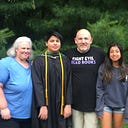Preparing the Public Service Leaders of Tomorrow
Practical experiences or formal classroom learning? For today’s college students, which is more valuable as they look toward life after graduation?
A few years ago, I was fortunate enough to speak to a large group of Latino students at my alma mater, the University of Virginia. That evening, those students were shocked when I revealed my deep, dark truth. I hold little stock in majors, minors, or undergraduate GPAs. Instead, when hiring I look for those who have experiences that demonstrate critical thinking, teamwork, writing, and multitasking skills. Skills that are usually found in internships and leadership activities, not in large lecture halls.
Of course, this position reflects my own biases. During my undergraduate years, I was fortunate enough to be managing editor of The Cavalier Daily, an independent student newspaper at U.Va. It meant I was responsible for a volunteer staff of 150, an annual advertising budget of $500,000, and the production of 16 pages of broadsheet news five days a week. I worked more than 100 hours a week producing a newspaper. To my mother’s dismay, that meant spending the bulk of my undergraduate years in the newsroom, not in the lecture hall.
I was also fortunate enough to serve as an intern. An upper-class course in the U.S. Congress during my first year of college led to an offer of a congressional internship that summer. That first internship led to two more congressional internships after my second and third years of college. And those opportunities resulted in a job offer from the President Pro Tempore (and former Majority Leader) of the U.S. Senate.
In receiving that first internship offer, I was able to parlay a class assignment to interview a congressional office into impressing the office enough that they encouraged me to apply for a summer internship. I took full advantage of my classroom requirements to gain practical experiences. Moreover, the internship came with a stipend that provided me enough money to pay for a train ticket that took me two hours from West Virginia to our nation’s capitol each morning, back home in the evenings, and just enough left over to afford a cheap lunch most days. I was living the dream, even if it was extremely rare for the time.
Today, such experiences are still rare. Internships, particularly those in public service, largely are unpaid. Internships on Capitol Hill and in other power centers are typically “earned” by those students whose parents have the connections to pull the strings to secure the positions in the first place. Those interns come from universities that speak of the importance of internship experiences, but that do little to ensure that their students earn credit or pay for said internships or do little to help those students without the connections secure the internships that could become career-definers.
All of which makes the work of Metropolitan State University of Denver and its Institute for Public Service all that more interesting … and important. I recently had the privilege of spending some time with Janine Davidson, the president of MSU for the past five years. A former Air Force officer and cargo pilot, Dr. Davidson served as Undersecretary of the U.S. Navy prior to her arrival in Denver.
President Davidson speaks of the transformation she has led at the third-largest public institution of higher education in Colorado, of her work at the 17,000 student Hispanic Serving Institution (HSI). She can point to all the campus has done to address the growing needs of Dreamers in the state and its commitment to meeting the legal, educational, and financial needs of college students falling under DACA (Deferred Action for Childhood Arrivals policy). The Institute for Public Service, though, is an exemplar that more colleges and universities should be looking toward.
In emphasizing the importance of internships and careers in public service, MSU not only focuses on the importance of public service, but on the realities that our nation’s systems, institutions (including colleges), and government offices “lack diverse and representative voices.” To uphold the principles and practices of a free and engaged citizenry, those centers of power have to be representative of the people they serve.
Before being asked if I was interested in applying for a congressional internship, I honestly didn’t know that such learning experiences even existed. Like so many students, including those at MSU, I was planning on spending my summer working at a local restaurant, hoping to save enough summer income to pay for college expenses. I got on that train to DC that first morning not knowing a single person who had previously interned and not knowing a single person who would be interning on the Hill that summer.
“Our program is demystification,” Dr. Davidson told me. “It’s career exploration. Students don’t know what is out there.” Through scholarships to make public service internships financially possible, through emphasizing the benefits of civil service, and through dispelling the negative view many students have today about government and its work, Metropolitan State University demonstrates that ambition and service should not, cannot, and must not be limited to those with the connections or financial needs to do so.
Thirty years after my first congressional internship, I still believe that such experiences are far more valuable to character and career development than sitting in a packed lecture hall. And I believe we need to do much more to make such internships accessible to more students, as we expand the pipeline and diversify the backgrounds of those pursuing such opportunities.
Our nation’s leaders of tomorrow are applying for internships today. Programs like MSU’s Institute for Public Service ensure that those leaders are representative of our nation, and are prepared to take on the mantle of public service.
